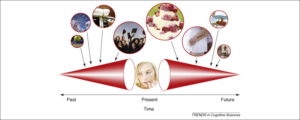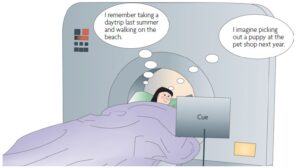In previous posts, I mentioned that future studies, cognitive science, and complexity science and chaos are related. Future studies has several definitions provided by researchers in different fields. In the viewpoint of cognitive scientists, futurism (thinking about the future) refers to our ability to mentally simulate the future and experience it before it happens. That is, by mentally simulating a situation in the future and its consequences, a person prepares himself for that situation. In fact, it does a kind of mental travel in the time dimension towards the future. Now the main question here is “where the raw materials and building blocks of this mental simulation are sourced from?” In response, it should be said that every moment you think about the future or even the past, all your mental contents are in your memory. That is, in a word, the raw materials and building blocks of mental simulation are provided from human memory. Human memory is divided into three general types. Episodic memory, semantic memory and procedural memory.

In episodic memory, a person brings to mind the image of a situation he had in the past. Iranian ladies (and maybe ladies in general) are masters of episodic memories. Because if they are asked, for example, in their friend’s wedding 5 years ago, what kind of clothes did a certain person wear? They are able to describe the color, model and other characteristics of the desired person’s clothes in detail. Episodic memory is more related to personal experiences of people in their life path. But semantic memory is more related to general knowledge of the subject. If a person talks in general about the state of the city where he spent his childhood (for example, a city with good or average facilities for life), he is actually using his semantic memory. If a person is asked in which province of Iran is the city “Miyaneh” located? That person refers to his semantic memory to reach the answer which is East Azerbaijan. The third type is procedural memory, which is more related to the part of memory that is responsible for learning a particular profession or skill. For example, driving is very easy and automatic for people who have been doing it for many years; Because the actions necessary to drive the car (decrease and increase the speed and gears, change routes, overtaking, etc.) are automatically retrieved from the person’s memory and the actions are performed. However, in mental simulations, the main raw materials come from these three types of memory.

fMRI
The interesting thing is that according to the neurological studies conducted with the help of functional magnetic resonance imaging (fMRI), it has been determined that the process of imagining and simulating future events depends on most of the related neural processes in remembering events (episodic memory). That is, the same part of the brain that is responsible for remembering an event in the past is also activated in imagining and simulating future events, and the neural networks of the brain activated during these two processes are similar in many ways.

The same part of brain that is responsible for remembering is responsible for imagining and simulating the future
In addition to these neurological studies, other studies have been conducted on patients with amnesia, which show that those who have trouble remembering past events are also incapable of simulating and imagining the future. In one sentence, it can be said that one of the main functions of human memory (especially episodic memory) is to provide the information needed for imagination and mental simulation of future events.
In the course of these studies, the Swedish scientist named David Ingvar went further and claimed that the events and concepts related to the future can be remembered in more details just like the events of the past. Dr. Ingvar called this part of concepts and events “memory of the future”. He said that every person simulates a set of different and alternative behaviors in his mind in relation to the issue he is dealing with, and depending on the event that happens in reality executes behavior consistent with that event.
This set of alternative behaviors that exist in a person’s mind actually constitute the “memory of the future” of that person. Therefore, the more a person simulates many and different situations in his mind and practices appropriate behaviors, the more he will be prepared for a wider range of possible future events. “Memory of the future” are actually future scenarios. By formulating future scenarios, individuals, organizations and governments strengthen their future memories and prepare for more futures. David Ingvar’s theory is actually the basis of thinking about the future and also the use of the scenario building method in the world of business and governments.

In conclusion, it should be said that the human memory system, which is responsible for remembering personal experiences and other past knowledge, also gives people the ability to think about the future or mentally travel to the future. In human mental travel, whether it is for traveling to the past (remembering) or for mental traveling to the future (simulating), the human memory system is fully involved.
It may seem paradoxical at first glance, but we humans ultimately remember the future.

 فارسی
فارسی
